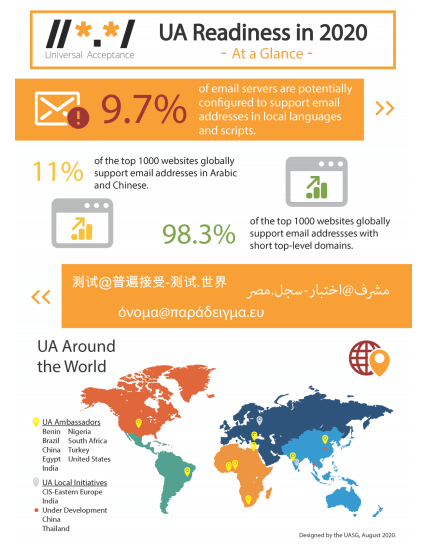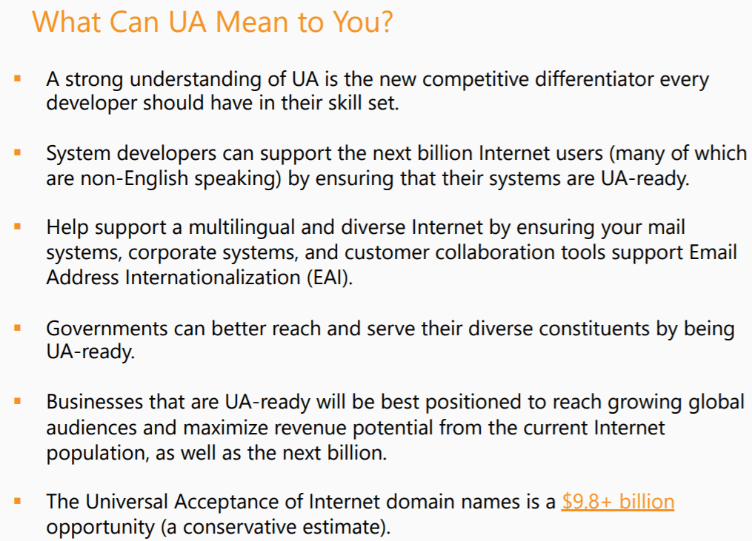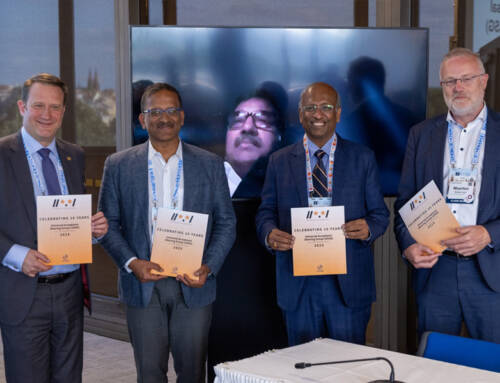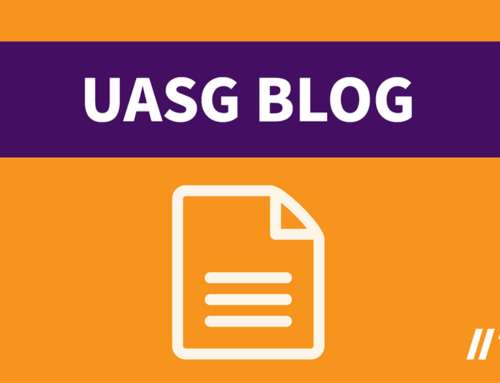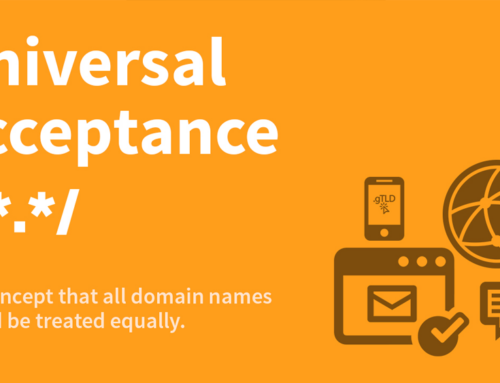By Dr. Ajay Data, Chair of the UASG
January 2021
2020 was a year unlike any other. Since the start of the COVID-19 pandemic, the Internet has provided people a way to connect with friends and families, conduct business, and stay up-to-date with the latest information. At a time when we’ve been more physically distant than ever, it is important to ensure that the Internet becomes more inclusive, diverse, and multilingual to unite all users around the world.
As we look back at what we’ve done to advance Universal Acceptance (UA) – the cornerstone to supporting a diverse Internet by enabling every person to navigate and communicate online using their chosen domain name and email address in any language, script, or character length – I’d like to acknowledge a few milestones, as well as call out where we need to focus as we move forward together in 2021.
The Universal Acceptance Steering Group’s (UASG) FY20 Universal Acceptance Readiness Report highlights results of a 2020 study that evaluated the world’s top 1,000 websites for their support of email addresses based on various top-level domains (TLDs). Notably, website support for email addresses using ASCII (American Standard Code for Information Interchange) characters was at an all-time high:
- 98 percent supported email addresses with short ASCII TLDs (up from 97 percent in 2019 and 91 percent in 2017), and
- 85 percent supported long ASCII TLDs (up from 84 percent in 2019 and 78 percent in 2017).
However, of those same websites, only 11 percent supported email addresses in Arabic and Chinese (a modest increase from 7 and 8 percent in 2019, respectively, and 8 percent each in 2017).
As we look ahead to 2021, a key focus of our UA efforts must include advancing support for Email Address Internationalization (EAI) which, to put it simply, allows people to send and receive email from addresses in non-Latin-based languages and scripts. Fortunately, this issue is gaining recognition among major tech players. Most recently, Apple’s 2020 release of iOS14 enabled users to send and receive email using addresses in Chinese, Japanese, Korean, Russian, Thai, and Hindi. Additionally, the UASG recently completed its first comprehensive round of EAI testing on popular global email systems, which had encouraging results. These are major steps towards building an inclusive Internet that can work for all users.
The domain names system was based on the American Standard Code for Information Interchange (Ascii), so it means that domain names were limited to characters, what we call the ‘letter, digit, hyphen scheme’, so basically letters A to Z, digits 0 to 9 and hyphen, so those were the only ones you could use to develop domain names. The community, eventually, as the internet expanded in countries that were not using the Ascii set of characters, had a clear need to expand this domain name system to support all the other languages and scripts around the world. – Sarmad Hussain, Sr. Director IDN & UA Programs, ICANN, BBC (14 April 2020)
Looking Back: Advance UA Readiness In 2020
UASG’s mission is driven forward by our dedicated members around the world who have made great strides to better support global Internet users. To all our volunteers – we thank you for your continued efforts and leadership within the Internet community!
In 2020, UASG members raised awareness and supported the remediation of non-UA-ready technology through global virtual trainings, workshops, and hackathons. Additionally, the Working Group members drove important UA gap analysis of current standards, technologies, services, and applications. Local Initiatives spread awareness of Internationalized Domain Names (IDNs) in their regional languages, and the UA Ambassadors organized informative meetings with influential tech companies in their respective regions. Notably, the UASG piloted a new program to expand training capacity through a Train-the-Trainer program, which taught more than 40 people from 17 countries how to train others on the fundamentals of UA.
| UASG Membership Groups | ||
|---|---|---|
| Group | Member Description | Role |
| Technology Working Group | Technical Experts (standards organizations, programming languages and platforms, application developers, open source licensing experts, etc.). | Oversee remediation work on standards, programming languages, tools, and development platforms. |
| Email Address Internationalization (EAI) Working Group | EAI technical experts (standards organizations, Internationalized Domain Names (IDNs), email administrators, etc.). | Oversee engagement with email software and service providers to make them EAI- ready. |
| Measurement Working Group | Members from the UASG Coordination Group, UA Ambassadors, and ICANN GSE team. | Identify UA readiness gaps in tools and technologies. |
| Communications Working Group | Communications experts (experience developing messaging, editing, writing, or presenting, etc.) | Develop communication strategy and oversees its execution in collaboration with other working groups. |
| Local Initiatives | UASG members from a respective local region, active local partners, influencers, UA Ambassadors, and ICANN GSE teams. | Conduct national or regional UA awareness, training, and stakeholder engagements. |
| UA Ambassadors | Industry leaders and UA experts who are committed to raising awareness around UA and EAI in their local region. | Organize training and outreach at national and regional levels. |
More detailed information on what each UASG group accomplished can be found in the ICANN69 presentations, as well as in the FY20 UA Readiness Report. Additionally, several materials were published to provide tangible UA-readiness guides for global and diverse audiences. A complete list of these materials, including gap analysis, technical documentation and a detailed case study outlining ICANN org’s efforts to become UA-ready, is available at the end of this blog.
Domain names do not exist in isolation from the larger ecosystem of online services and content, and IDNs are no exception. In fact, the uptake of IDNs could be more challenging should there not be enough content in the same IDN language / script to serve the local community. Simply put, why would anyone use a domain name in Arabic for a website whose content is not in a language that uses Arabic script? – Baher Esmat, Vice President, Stakeholder Engagement – Middle East & Managing Director – Middle East & Africa (MEA), ICANN, IDN World Report (28 February 2020)
Looking Ahead: Supporting a More Inclusive and Multilingual Internet in 2021
In 2021, UASG members will collectively focus on raising awareness of UA and EAI issues among key stakeholders, developing remediation and training materials, as well as supporting developers, and email software/service providers in updating their systems. Below is an outline of key activities by Working Group:
| Group | Key 2021 Activities |
|---|---|
| Measurement WG |
|
| EAI WG |
|
| Technology WG |
|
| Communications WG |
|
| Local Initiatives |
|
| UA Ambassadors |
|
Get Involved: Help Worldwide Users Experience the Power of the Internet
I am encouraged by our progress and focus for 2021. As we begin this new year, the economic and social benefits of supporting multilingual Internet users in their ability to access and connect to ecommerce, local communities, and governments, as well as to embrace and proliferate cultural traditions through language are clear. And there is still much more work to be done!
As a collaborative group, we welcome feedback and participation by anyone interested in enabling online choice and achieving digital inclusivity. There are many ways you can support this mission – from reading UASG articles and increasing your awareness, to sharing information with colleagues, to attending (virtually, for now) industry events, or volunteering your time and expertise on one of our working groups. If you’d like to get involved, consider joining a UA Working Group, becoming a UA Ambassador, establishing a UA Local Initiative, or contacting us for more information.
Thank you again to all of the people and organizations around the globe working to make the Internet more inclusive and representative of our diverse world.
2020 UASG Published Reports, Resources, and Industry Content
- ICANN UA Case Study (UASG 013C.2) – deep-dive into ICANN’s journey and its three-stage process towards achieving UA.
- UA Compliance of Some Programming Language Libraries and Frameworks (UASG 018A) – results of verifying the UA readiness of C, C#, Go, Java, Javascript, Python3, Rust, and frameworks, including the testing of internationalized email.
- UA Readiness Framework (UASG 026) – framework for scoping UA conformance work on software applications, focusing on the major components of an application to help developers more easily problem solve.
- Country-based Evaluation of Websites for Acceptance of Email Addresses in 2020 (UASG 027) –following 2018 and 2019 testing (UASG025) that evaluates the acceptance rates of internationalized email addresses by websites in different countries.
- Considerations for Naming Internationalized Email Mailboxes (UASG 028) – provides considerations for email system administrators to provision mailboxes, configure, and manage systems
- Evaluation of EAI Support in Email Software and Services Report (UASG030) – comprehensive EAI testing results on popular global email systems.
- Industry articles: https://uasg.tech/uasg-in-the-news/
- UASG blogs: https://uasg.tech/announcements/


